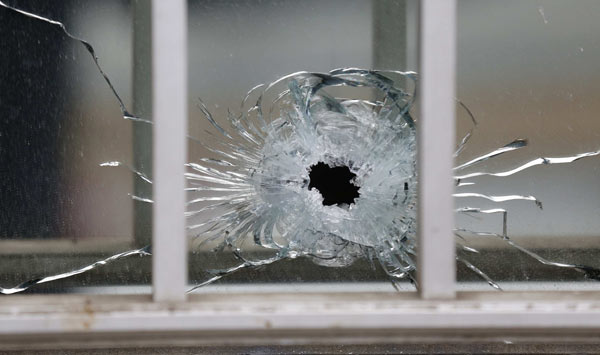Deadly Paris shooting triggers outcry in France, abroad
 0 Comment(s)
0 Comment(s) Print
Print E-mail Xinhua, January 8, 2015
E-mail Xinhua, January 8, 2015
|
|
|
A bullet's impact is seen on a window at the scene after a shooting at the Paris offices of Charlie Hebdo, a satirical newspaper, January 7, 2015. [Photo/China Daily via agencies] |
Hours after the shooting, the perpetrators' whereabouts are still unknown. A massive manhunt operation is underway to hunt them down.
In a press conference, Paris Porsecutor Francois Molins said at least two men opened fire on the weekly staff and killed 10 journalists, a policeman and an economist invited by the newspaper.
Molins also added that 11 others were injured with four in critical condition, while he refused to give further details on the investigation.
In November 2011, headquarters of Charlie Hebdo was fire-bombing after it put an image of the Prophet Mohammad on its cover.
In its last published cartoons, the weekly mocked Abu Bakr al-Baghdadi, the leader of the Islamic State, which seized major towns in Iraq and Syria.
Speaking in French, U.S. Secretary of State John Kerry, who has close ties to France, condemned the attack saying "all Americans stand alongside France."
In Berlin, German Chancellor Angela Merkel also condemned the "abominable act" which hit "freedom of speech and the press, core elements of our free democratic culture."
UN Secretary General Ban Ki-moon described the attack as "a horrendous, unjustifiable and cold-blooded crime."
According to the Interior Ministry, 500 additional policemen are deployed in the capital and suburbs to secure public places, including main tourism sites, train stations and stores.
An emergency government meeting was held in Elysee. A second council is scheduled for Thursday morning.
Calm in Paris was shattered in 1995 when a terrorist bomb attack in the Paris subway killed eight people and wounded some 200 others. Charlie Hebdo shooting, which caused at least 12 deaths, is the most deadly attack in France in 50 years.






